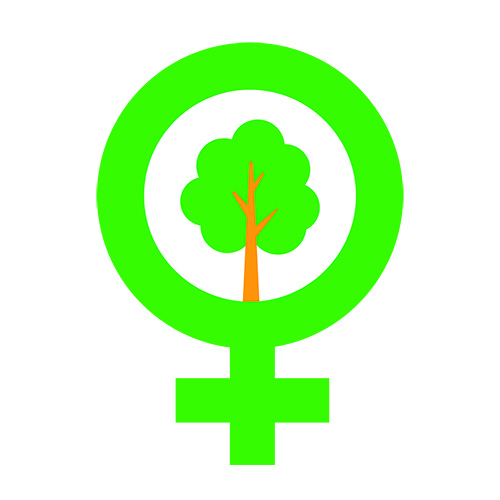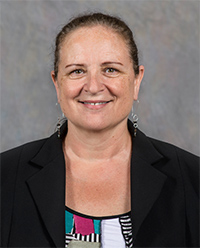- Apply
- Visit
- Request Info
- Give
Visiting professor presents on evolution of ‘ecofeminism’
Written by Molly Boucher
Published on March 25, 2021
 Patricia Glazebrook, professor of philosophy at Washington State University, presented “Ecofeminism Then and Now” at Eastern Connecticut State University on March 23. The virtual lecture was hosted by Ana Funes-Maderey, professor of philosophy. Glazebrook works across the United States and other nations in Washington, Texas, Nigeria, Berlin and Toronto.
Patricia Glazebrook, professor of philosophy at Washington State University, presented “Ecofeminism Then and Now” at Eastern Connecticut State University on March 23. The virtual lecture was hosted by Ana Funes-Maderey, professor of philosophy. Glazebrook works across the United States and other nations in Washington, Texas, Nigeria, Berlin and Toronto.
A complex issue, ecofeminism falls into the category of third-wave feminism and is also considered an emerging area of philosophy. The movement considers both ecological and feminist concerns, citing them both as areas that have been dominated by men. Glazebrook expanded on this concept, saying that both nature and women have historically been viewed as “other” by men, and therefore have not been priorities in male-dominant societies, causing long-term impact.
The presentation was split into several stages, including women’s agriculture, science, philosophy and bias, indigenous voices and what has been learned in almost half a century of ecofeminism. Glazebrook covered each area with in-depth analysis, going over a variety of topics in each. Issues that were highlighted included a woman’s connection to motherhood, as well as women’s impact on labor and work, such as farming and agriculture, and the biases women face when finding careers. She went on to explain that these biases have obvious examples, such as the fact that the 22 richest men in the world have more wealth than all the women in Africa combined. Glazebrook cited discrimination against women as a “patriarchal” mindset, and discussed its lasting impacts on women and the environments they live and work in.

While acknowledging that women are not connected to nature any more than men, Glazebrook said the agricultural business is highly dependent on women’s labor, which often goes without recognition. Saying that economies would crumble without the labor of women, she went on to explain that often the women commit to the bulk of the labor and are often extremely underpaid —as little as a dollar per day. “Science is inheritably gender biased,” said Glazebrook. “There’s a strong need to listen to women from throughout the world.”
Glazebrook then went on to describe the role of motherhood, saying that “although not every woman will become a mother, everyone comes from a mother.” The role of motherhood has had a major impact on women in the labor force. While there is no physical or biological reason for women to work domestic jobs, or no “love gene” as Glazebrook put it, women do make up the majority of domestic labor. This resulted in the question being posed, “How does the fact that women are birth givers make them exceptional at domestic duties?” In actuality, the reason women make up the domestic workforce is because their jobs have centered around care practice and labor, due to their responsibility to birth children.
She then went on to say that focusing on women’s historical role in childbirth will lead to continued overpopulation. She also provided data to show that “before 1900, 50 percent of women's deaths were due to pregnancy.”
Ecofeminism, which began in 1974, has gone through many stages in the past 50 years. The movement, which began as a celebration of taking back the power of women’s bodies, has evolved into a movement that covers a variety of topics. Glazebrook not only touched on the impact of women in agriculture, but the harmful view of women as a symbol of nature, saying that while “nature is used for production, women are used for reproduction.” The association of women and nature, as shown by terms such as “mother nature,” or the work of renowned philosophers such as Sir Francis Bacon, who would gender nature as “she,” shows that femininity is often associated with nature, and this one as something to be exploited. As long as nature continues to be understood as a resource to be extracted and conquered, women’s bodies will continue to be treated as resources to be utilized rather than as agents that have the freedom to determinate their own lives.
Glazebrook also cited numerous women who have paved the way for the future of ecofeminism, such as Karen Warren, Vandana Shiva, Starhawk, Paula Gunn Allen and Winona LaDuke. While not all the women are explicitly ecofeminists, they all have worked to bring attention to the lack of concern applied to nature and/or women. She also stated that you do not need a woman to be an ecofeminist; anyone can contribute to its goals.
In her closing, Glazebrook answered questions posed by students. Asked about a variety of topics, including ecoefficiency, the connection between ecofeminism and Taoism, and the debt owed to women, she answered each question thoroughly. She also made a point to focus on the future, rather than past mistreatment of women, saying, “The debt women are owed is increasing, and women and allies alike can understand that.”


